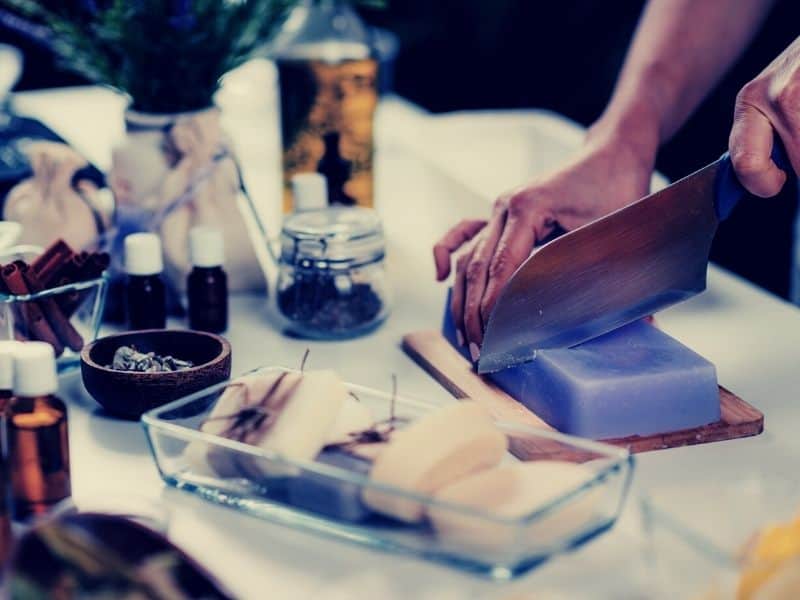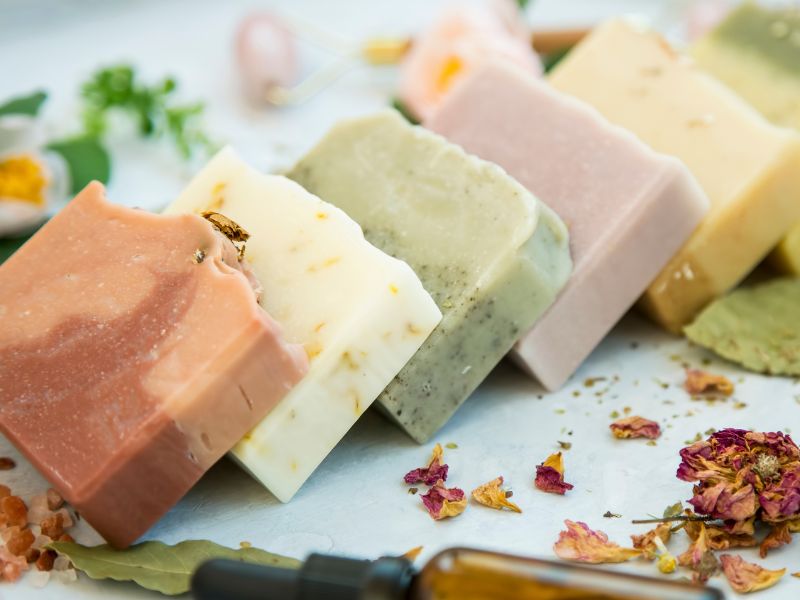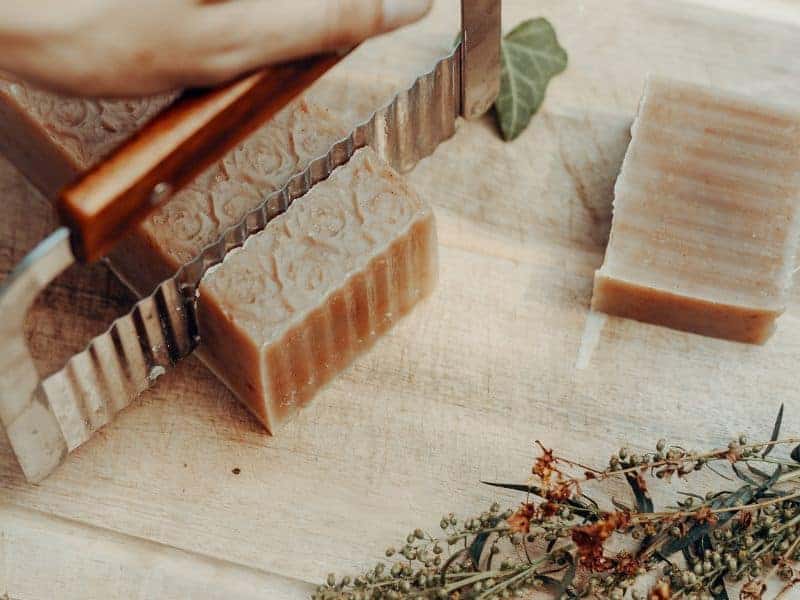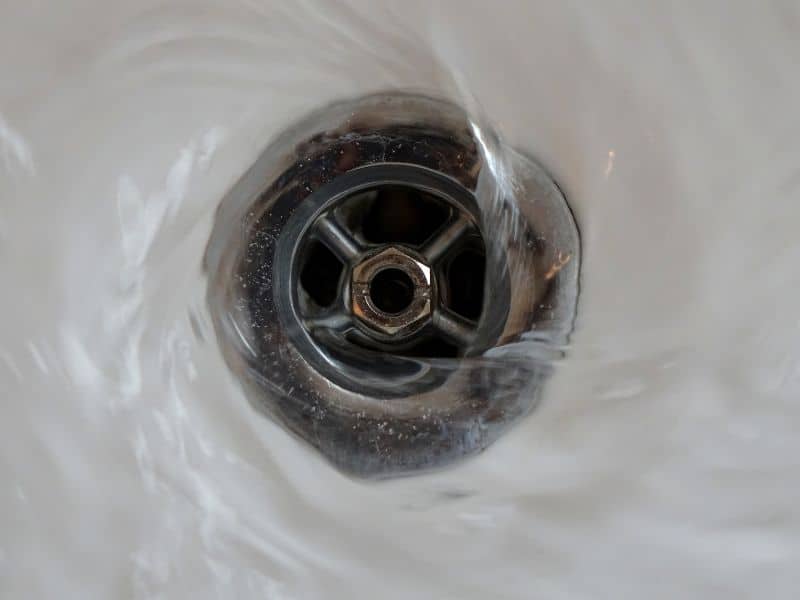Like most hobbies, soap making comes with some risks. However, it isn’t anything too extreme. With a few precautions and some PPE, you can safely make soap. With that said, why is soap making dangerous?
Soap making is dangerous because it comes with risks of burns, cuts, particulate inhalation, and poisoning. Lye can cause burns, cutting soap can cause cuts, pigments can be inhaled and lye and pigments can cause poisoning.
While the dangers of soap making are significant, there are ways to avoid these dangers. Let’s take a look below.
Dangers Of Soap Making
Here are a few of the risks and dangers associated with soap making that you should prepare for and avoid.
Burns
Lye is a caustic chemical and can cause severe burns. Always take care when working with lye and always use gloves, goggles, and a mask.
Cuts
Cuts are another common danger when soap making. be very careful when cutting soap, especially with a knife.
Chemical poisoning
Lye and other chemicals in soap making can cause poisoning if ingested. Always take care to avoid contact with your mouth and eyes.
Inhalation
Pigments and other chemicals in soap making can be inhaled, which can cause health problems. always work in a well-ventilated area and avoid breathing in the fumes.
Dangers Of Using Lye To Make Soap
Lye is a highly dangerous chemical and should be treated with respect. Here are a few dangers of using lye:
- Lye can cause severe burns if it comes into contact with skin
- Lye can cause blindness if it comes into contact with eyes
- Lye can cause death if ingested
- Lye is corrosive and can damage clothing, skin, and other material
- Lye has its dangers but it is an important part of the soap-making process.
How To Avoid Soap Making Dangers
Here are a few tips for avoiding the dangers of soap making.
- Always wear gloves, goggles, and a mask when working with lye.
- Be very careful when cutting soap. Use a sharp knife and cut away from your body.
- Make sure you work in a well-ventilated area.
- Avoid breathing in the fumes from pigments and other chemicals.
- Keep soapmaking ingredients out of reach of children.
Soap making is a fun, creative hobby that with a few precautions can be safe. By following the tips above, you can avoid the dangers of soap making and safely enjoy this fun activity.
Soap Making Worth The Risk?
Making homemade soap can be a fulfilling and rewarding experience. Not only do you have the satisfaction of creating something with your own hands, but you also have control over the ingredients that go into your soap. By making your own soap, you can avoid the harsh chemicals and additives found in many commercial soaps.
Minimize Safety Risks
While there are safety risks involved in soap making, they can be minimized by taking proper precautions and following safety guidelines. The use of lye, for example, is necessary in the soap making process but can be safely handled by wearing protective gear and working in a well-ventilated area. Heating oils and liquids can also be done safely by following proper instructions and using caution.
Save Money Making Soap
Additionally, making your own soap can save you money in the long run. Once you have the necessary equipment and ingredients, you can make soap for a fraction of the cost of store-bought alternatives. You can also experiment with different ingredients and scents to create a personalized soap that meets your individual needs and preferences.
Homemade Soap is Worth It
Overall, the potential safety risks of making homemade soap are worth it for many people who value natural, chemical-free products and enjoy the process of creating something from scratch. By following proper safety guidelines and taking necessary precautions, you can minimize the risks and enjoy the benefits of making your own soap.
Soap Making Safety Gear
It is a good idea to get some PPE or safety gear when you get into soap making.
Gloves
Gloves can help protect your hands from chemical burns and cuts. You should wear gloves whenever handling corrosive chemicals to avoid any burns or skin irritation.
Goggles
Goggles can protect your eyes from lye and other chemicals. It is a good idea to wear goggles whenever you are working with soapmaking ingredients to avoid any injuries.
Mask
A mask can help protect your lungs from particulate matter and other chemicals in the air. Always wear a mask when soap-making to avoid any health problems.
Apron
An apron can help protect your clothes from spills and splashes. It is a good idea to wear an apron whenever you are soap making to avoid any messes.
Safety Tips For Soap Makers
Here are some general safety tips for soap making.
- Be very careful when handling lye. Lye is a caustic chemical and can cause severe burns.
- If you get lye on your skin, rinse with cold water and seek medical attention.
- Always use gloves, goggles, and a mask when working with lye.
- Be very careful when cutting soap. Use a sharp knife and cut away from your body.
- Make sure you are working in a well-ventilated area.
- Avoid breathing in the fumes from pigments and other chemicals.
- Keep soapmaking ingredients out of reach of children.
Soap making is a fun, creative hobby that with a few precautions can be safe. By following the tips above, you can avoid the dangers of soap making and safely enjoy this fun activity.
Frequently Asked Questions
Soap making can be dangerous because it comes with risks of burns, cuts, particulate inhalation, and poisoning. Lye can cause burns, cutting soap can cause cuts, pigments can be inhaled and lye and pigments can cause poisoning.
Always wear gloves, goggles, and a mask when working with lye. Be very careful when cutting soap. Make sure you work in a well-ventilated area. Avoid breathing in the fumes from pigments and other chemicals. Keep soap making ingredients out of reach of children.
You should wear gloves, goggles, and a mask whenever you are working with soap making ingredients to avoid any injuries. It is also a good idea to wear an apron to protect your clothes from spills and splashes.
Be very careful when handling lye. Lye is a caustic chemical and can cause severe burns. Make sure you are working in a well-ventilated area. Avoid breathing in the fumes from pigments and other chemicals. Keep soap making ingredients out of reach of children. Soap making is a fun, creative hobby that with a few precautions can be safe. By following the tips above, you can avoid the dangers of soap making and safely enjoy this fun activity.
A. If you get burned while soap making, rinse the area with cold water and seek medical attention if necessary. Do not apply any lotions or creams to the area as they will likely make the burn worse.
Conclusion
Soap making can be a fun and creative hobby, but it comes with some risks. By following the tips above, you can avoid the dangers of soap making and safely enjoy this activity.
If you do get burned while soap making, rinse the area with cold water and seek medical attention if necessary. Do not apply any lotions or creams to the area as they will likely make the burn worse.






